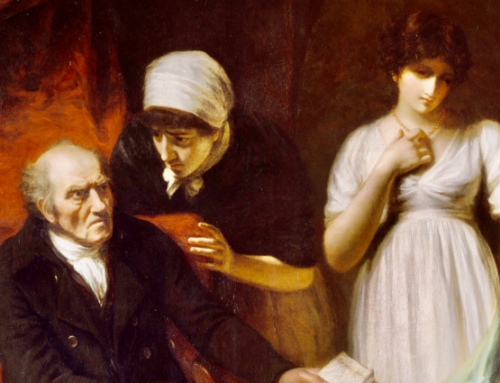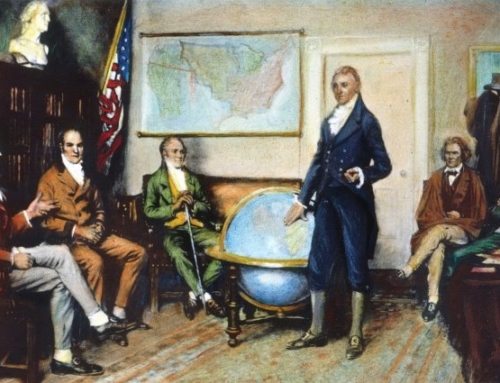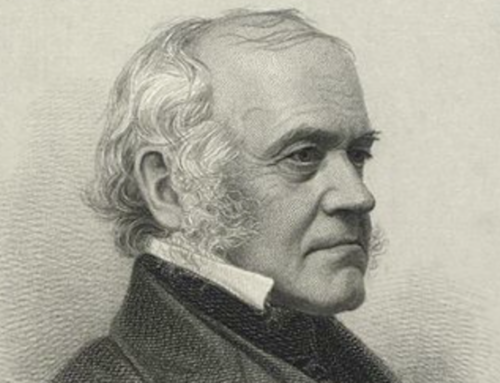 I first came across Russell Kirk’s belief that academics must serve as guardians of “the Word” in his groundbreaking but now sadly-neglected book, Academic Freedom: An Essay in Definition (1955). “The principle support to academic freedom, in the classical world, the medieval world, and the American educational tradition, has been the conviction, among scholars and teachers, that they are Bearers of the Word—dedicated men, whose first obligation is to Truth, and that a Truth derived from apprehension of an order more than natural or material.” If we love the Word—that is, the eternal Logos—Kirk explained, almost a full decade prior to his formal conversation to Christianity, we must also love and protect words. We must understand their definitions, agree to what those definitions are, and debate our ideas for this world and the next based on the first principles of and for the respect for the words themselves. As God gave Adam the power to name things, we maintain that duty and that legacy. Yet, it is not for us to change the meaning of a word based on our will or our whim. Just as common law is rooted in eternal truth but expressed locally, so, too, is language. It would prove not only morally reprehensible to change definitions for light and transient reasons of pride and convenience, but it would also prove to destabilize even the best of societies, as its members would endlessly speak past one another. “For the professor is respected, and respects himself, because he is master of a high discipline and the teacher of a traditional and valuable body of knowledge; he is keeper of a people’s wisdom; he is the servant of the Truth, and of the Truth only,” the then-Stoic Kirk argued. “If he lowers his standards of learning, or is forced to lower them; if he becomes an indoctrinator, rather than a professor of arts or sciences, or is compelled to indoctrinate his students.” To serve the propaganda wing of a corporation, a bureaucracy, or a community is akin to evil itself.
I first came across Russell Kirk’s belief that academics must serve as guardians of “the Word” in his groundbreaking but now sadly-neglected book, Academic Freedom: An Essay in Definition (1955). “The principle support to academic freedom, in the classical world, the medieval world, and the American educational tradition, has been the conviction, among scholars and teachers, that they are Bearers of the Word—dedicated men, whose first obligation is to Truth, and that a Truth derived from apprehension of an order more than natural or material.” If we love the Word—that is, the eternal Logos—Kirk explained, almost a full decade prior to his formal conversation to Christianity, we must also love and protect words. We must understand their definitions, agree to what those definitions are, and debate our ideas for this world and the next based on the first principles of and for the respect for the words themselves. As God gave Adam the power to name things, we maintain that duty and that legacy. Yet, it is not for us to change the meaning of a word based on our will or our whim. Just as common law is rooted in eternal truth but expressed locally, so, too, is language. It would prove not only morally reprehensible to change definitions for light and transient reasons of pride and convenience, but it would also prove to destabilize even the best of societies, as its members would endlessly speak past one another. “For the professor is respected, and respects himself, because he is master of a high discipline and the teacher of a traditional and valuable body of knowledge; he is keeper of a people’s wisdom; he is the servant of the Truth, and of the Truth only,” the then-Stoic Kirk argued. “If he lowers his standards of learning, or is forced to lower them; if he becomes an indoctrinator, rather than a professor of arts or sciences, or is compelled to indoctrinate his students.” To serve the propaganda wing of a corporation, a bureaucracy, or a community is akin to evil itself.
In some way—perhaps in some mysterious way—I always understood Kirk’s argument, even as a young child. As I mentioned in my previous post, I grew up in a house and community wonderfully surrounded by a seemingly endless sea of books. Whether I was reading a child’s biography of Benjamin Franklin, a fantasy story about a mouse and a motorcycle, an action novel about the Jewish resistance to the Nazis in Poland, or a history of the Soviet Union, I cherished the word, the words, and the truth of words. I cherished them in isolation, and I cherished them within strings of words, whether as prose or poetry.
Thanks to a brilliant mother, I always had at hand the World Book Encyclopedia, two or three hardback dictionaries, and several thesauruses. I loved words. I loved knowing what words meant. And, I loved chasing words from one to another. My mother taught me early on that I should never just skip over a word I did not understand. I should figure it out, first, from the context and second from the dictionary. She also taught me, wisely, that a thesaurus is a guide, not a bible. And, it was not just my mother. The Dominican nuns who taught at Holy Cross grade school in Hutchinson, Kansas, also stressed the same ideas. Though I did not know this at the time, I was being given a very solidly Thomistic foundation for comprehending the world.
When I arrived in high school—a public high school, not the Catholic one—I immediately joined the debate team. Nothing in my education gave me as much a foundation for my adult life as did debate. If debate had ever caught on like football and baseball did, I would have dedicated my life to being a professional debater. Major League Debate. The Debate World Series. Ok, just a little bit of fantasy there. . . But, yes, I learned once again in debate the absolute necessity of employing the proper definition of a word. If I failed to understand my own vocabulary, the opposing team justly took me down. If the opposing team failed to understand its own vocabulary, I went for the jugular. After all, how can anyone debate an issue if they are not arguing from the same objective understanding of the terms employed?
Throughout history, of course, tyrants and demagogues have always manipulated language for their own self-interest and political advantage. Perhaps no tyrants in history did this with more skill than did the caesars in maintaining the language, institutions, and symbols of the Roman Republic while establishing the iron-fisted rule of the executive. To be sure, others have done the same. The grand sociologist Robert Nisbet went so far as to describe the entire history of the political state as the history of euphemism. What is surprising in 2019, then, is not that politicians and bureaucrats manipulate language, but rather that American and western societies as a whole have fallen for the propaganda so easily and readily. Even with blatant warnings from Ray Bradbury and George Orwell, we have still fallen hard. Critical words—such love, myth, and imagination—have become things they were never meant to become, inverted, converted, and ripped apart until almost unrecognizable from their original meanings. Lesser words—such have gay, faggot, and dogma—have taken on entirely new meanings as well.
The traditional virtues have fared even less well, often ignored and mocked, indicating a wretched lack of respect for all that truly matters in this world. Few talk about fortitude, but justice has become vengeance, faith has become fiction, prudence has become timidity, and temperance has become abstinence. One best-selling author in the twentieth century even attempted to claim that selfishness is the highest virtue, thus diabolically replacing love from its proper place.
For any of us who identify with conservatism, we must understand and accept that one of our highest priorities should be to “conserve” the traditional meanings of words. After all, if we love the Word, we must guard our words.
The Imaginative Conservative applies the principle of appreciation to the discussion of culture and politics—we approach dialogue with magnanimity rather than with mere civility. Will you help us remain a refreshing oasis in the increasingly contentious arena of modern discourse? Please consider donating now.
Editor’s Note: The featured image is “An Old Man Reading” (1729) by Willem van Mieris (1662-1747), courtesy of Wikimedia Commons.







Leave A Comment